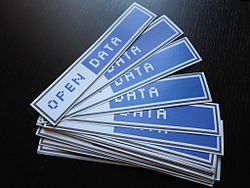
Back بيانات مفتوحة Arabic Адкрытыя даныя Byelorussian Отворени данни Bulgarian উন্মুক্ত উপাত্ত Bengali/Bangla Dades obertes Catalan Otevřená data Czech Åbne data Danish Open Data German Ανοιχτά Δεδομένα Greek Malfermitaj datumoj Esperanto



Open data are data that are openly accessible, exploitable, editable and shareable by anyone for any purpose. Open data are generally licensed under an open license.[1][2][3]
The goals of the open data movement are similar to those of other "open(-source)" movements such as open-source software, open-source hardware, open content, open specifications, open education, open educational resources, open government, open knowledge, open access, open science, and the open web. The growth of the open data movement is paralleled by a rise in intellectual property rights.[4] The philosophy behind open data has been long established (for example in the Mertonian tradition of science), but the term "open data" itself is recent, gaining popularity with the rise of the Internet and World Wide Web and, especially, with the launch of open-data government initiatives Data.gov, Data.gov.uk and Data.gov.in.
Open data can be linked data—referred to as linked open data.
One of the most important forms of open data is open government data (OGD), which is a form of open data created by ruling government institutions. The importance of open government data is born from it being a part of citizens' everyday lives, down to the most routine and mundane tasks that are seemingly far removed from government.[citation needed]
The abbreviation FAIR/O data is sometimes used to indicate that the dataset or database in question complies with the principles of FAIR data and carries an explicit data‑capable open license.
- ^ "What is open?". okfn.org. Retrieved 22 March 2022.
- ^ "Open Definition 2.1 - Open Definition - Defining Open in Open Data, Open Content and Open Knowledge". opendefinition.org. Retrieved 22 March 2022.
- ^ Auer, S. R.; Bizer, C.; Kobilarov, G.; Lehmann, J.; Cyganiak, R.; Ives, Z. (2007). "DBpedia: A Nucleus for a Web of Open Data". The Semantic Web. Lecture Notes in Computer Science. Vol. 4825. pp. 722–735. doi:10.1007/978-3-540-76298-0_52. ISBN 978-3-540-76297-3. S2CID 7278297.
- ^ Kitchin, Rob (2014). The Data Revolution. London: Sage. p. 49. ISBN 978-1-4462-8748-4.